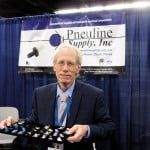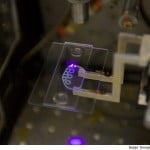
Routine genome sequencing of newborns is often cited as an aspirational component of precision healthcare. It is being studied in clinical research settings123 and, conceptually, is an extension of screening newborns for genetic diseases. Today’s newborn screening involves analysing metabolites, but a broader implementation that includes genome sequencing will eventually happen.
Extensive clinical evidence has shown that screening for genetic diseases saves lives. Research has shown that it can be cost effective,4 especially when the expense of genome sequencing is amortised across the many diseases and pharmacogenetic traits for which the sequence is available over a lifetime. We therefore contend that the central issue is timing: although we are not prepared today for widespread, routine genome sequencing in newborns, it is coming within a few decades.
Phased rollout
Newborns should not be screened for all potential diseases, however. Insufficient data support this idea, which would likely overwhelm families and healthcare systems, and it is difficult to show that full screening would have clinical utility for adult onset or untreatable disorders. We instead advocate a phased rollout of the process, where the genome sequence is generated at birth and where, over time, genomic variants are disclosed sequentially in newborns (for example, designated newborn screening conditions), children (Wilms’s tumour, retinoblastoma), teenagers (aortopathy, cardiomyopathy), reproductive years (carrier risks), and adults (colon, breast cancer). This approach would disclose findings at a life stage when interventions are known to be beneficial.
Such a rollout of genomic information should be guided by oversight bodies that determine which variants have reached sufficient evidence for clinical utility at specific ages and circumstances, analogous to the bodies that guide current newborn screening,5 with informed consent and appropriate opt-outs. Furthermore, data on a person’s genome sequence should reside in a repository linked to his or her medical record, readily accessible to healthcare providers and available for reanalysis to keep pace with knowledge.
In addition to the age correlated analyses mentioned above, the sequence could be examined when a drug with pharmacogenetic guidance is prescribed or at the onset of relevant symptoms, such as neuropathic pain or renal failure,6 to facilitate rapid diagnosis and informed management of potential genetic explanations. Although the greatest current utility of genomic information is for diagnosing single gene diseases, rapid advances are being made in polygenic and multifactorial risk scores,7 which may have similar utility to single gene diseases.8
To realise the anticipated benefits of routine newborn genome sequencing, progress is needed in several areas. First, the sequence data quality must be sufficiently high that repeat genome sequencing would unlikely be needed. Second, we need appropriate genomics oriented information management and clinical decision support systems.
But we reject the often heard call for all non-genetics healthcare professionals to be extensively trained in genetics and genomics, which would be impractical and unnecessary. The rapid rollout of other technologies (for example, polymerase chain reaction testing for SARS-CoV-29 or non-invasive prenatal testing10) show that clinicians and professional societies can readily adapt to new approaches when strong clinical utility is clear.
Faster, more accurate diagnoses
Only by sequencing the entire genome of a person early in life can the full potential of genomic diagnosis be realised for the enormous cumulative burden of genetic diseases, the exciting potential of polygenic and pharmacogenetic risk assessment, and the ability to respond rapidly to future genomic advances. Each of these provides additional opportunities to make diagnoses more quickly and accurately and to bring targeted and gene based therapies to the bedside with minimal delay.
By embracing a health ecosystem that offers universally available routine newborn genomic screening, we can maximise learning to ensure that the benefits of genomics reach the broadest range of people, minimise disparities, and bring greater health to all.
No—David Curtis
Genomics England, a government owned company, recently announced a pilot programme of whole genome sequencing to screen for genetic diseases in 200 000 healthy seeming newborns.11 What is being proposed is not simply to interrogate the sequence for extremely rare, actionable findings and then discard it. Instead, the proposal is to acquire and retain the whole genome sequence from every newborn baby. A person’s genome is a vast quantity of personal data, and no grounds justify routinely acquiring this from all citizens before they are old enough to have the capacity to provide informed consent.
The clearest potential utility for the individual is identifying previously unsuspected genetic variants that have a major effect on disease risk (such as those that cause familial forms of cancer) for which specific preventive measures can be taken, such as screening programmes or prophylactic surgery.121314 Only a tiny number of such conditions require action to be taken before the individual reaches maturity and is able to consent to be screened, and processes already exist to test newborns for these conditions.
Genome sequencing can also provide information about the risk of developing many conditions for which no specific intervention is available.15 Even if some adults are interested in obtaining this risk information, there is no justification for assessing the risk of future health problems in newborn babies without their consent.
A question of utility and trust
Several aspects of newborn genome sequencing might be of benefit to wider society rather than the individual tested. One such benefit that has been proposed would be identifying unrecognised disease in parents, such as familial hyperlipidaemia.16 However, this cannot be used as a justification for sequencing babies’ genomes, as one could simply screen the parents themselves for such conditions.
Genome sequencing could be useful to identify potential tissue and organ donors who would be well matched to unrelated recipients. At present some legislatures allow children to be donors only for relatives, but the issues are complex and there is no strong argument to maintain this restriction.17
Information about the risk of future disease is also useful for determining health and life insurance premiums. In the United Kingdom current restrictions against using genetic data are voluntary and temporary.18 In the United States genetic test information can already be used to determine life insurance premiums, and people are advised to obtain insurance before acquiring potentially unhelpful test results.19
A database of genome sequence data could also be extremely useful for forensic purposes. A DNA sample from a crime scene can be used to identify distant relatives of a perpetrator quickly, enabling fast identification and apprehension.20 Some legislatures and organisations have restrictions on such use, but there is no guarantee that these will be maintained in the long term.
If we contemplate the universal genome sequencing of babies now, we should in our imaginations be asking the adults of 20 years in the future, “Are you happy that this was done to you?” Some governments today are reportedly carrying out mass collection of DNA, with the potential to use it for repressive practices up to and including forced organ harvesting.21 Do we trust that the governments we will have in 20 years’ time will keep the data secure and refuse to allow uses that we would currently regard as unethical?
So, why should we be contemplating genome sequencing of babies, who have no say in the matter, when as a society we have not agreed that all adults, for whom the potential health gains seem much greater, should undergo this process? Let us first answer the question, “Should all adults have their genome sequenced?” If the answer is no (as mine is), then we should restrict medical testing of newborns to the small number of conditions for which it is agreed that testing provides a real benefit to them.
[“source=bmj”]











